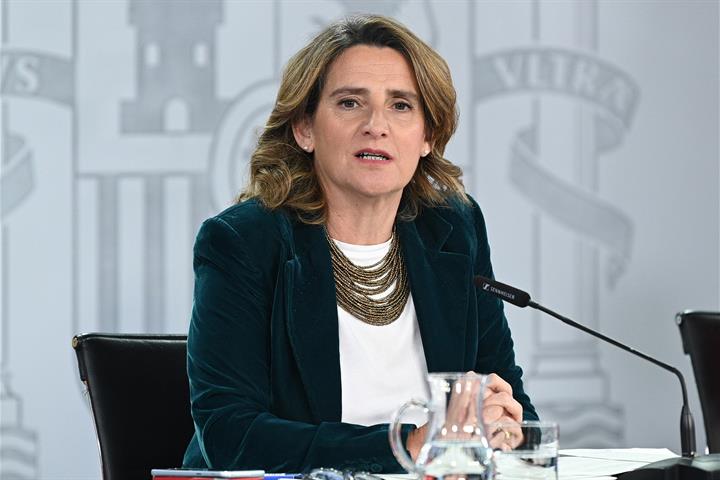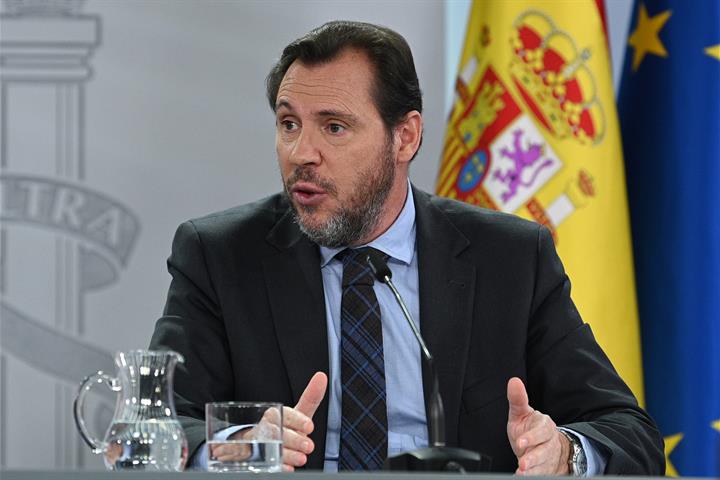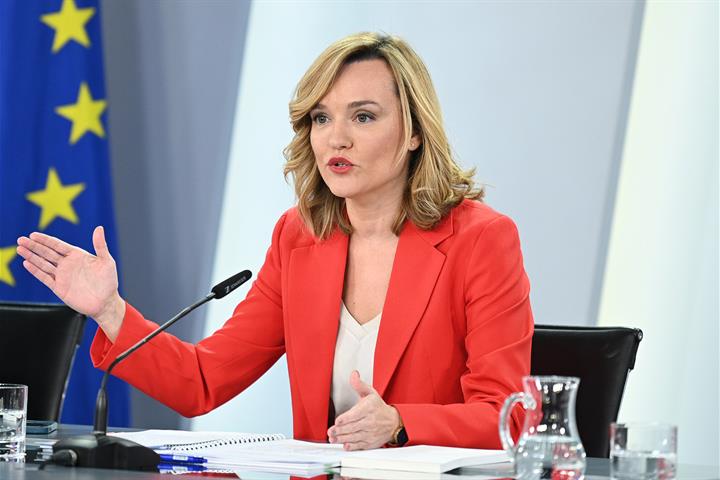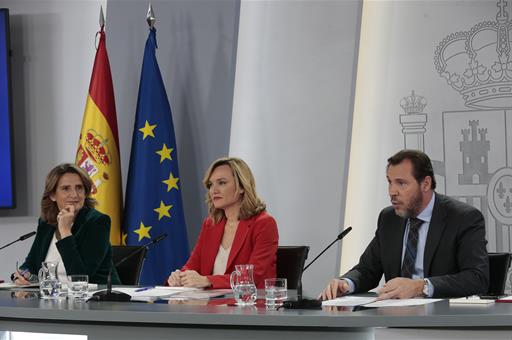Council of Ministers
The Government of Spain re-establishes the energy markets regulator, incorporating decarbonisation as an objective
Council of Ministers - 2024.2.20
Moncloa Palace, Madrid
The Council of Ministers has agreed to initiate the legislative process to restore the National Energy Commission as an independent energy regulatory authority.
The Third Vice-President of the Government of Spain and minister for Ecological Transition and the Demographic Challenge, Teresa Ribera, explained that the aim is to re-establish this body as it existed before the merger in 2013 of all the regulators into the National Commission for Markets and Competition.
Ribera stressed that the National Energy Commission will increase its specialisation and scope of action in the face of the profound transformation of energy markets. In addition to ensuring the proper functioning of markets and free competition, this body will incorporate decarbonisation as an objective.
This commission will be responsible for overseeing and monitoring the markets for electricity, liquid hydrocarbons, natural gas, green hydrogen and other renewable gases. In addition, it will assume regulatory functions, the advisory function currently carried out by the National Markets and Competition Commission, advice and resolution of conflicts that may arise between operators, and inspection and sanctioning functions.
The new entity must be constituted and fully operational within four months of the approval of the law, whose preliminary draft, examined today, will go out for hearing and public information and will have to return to the Council of Ministers for its referral as a bill to the Cortes.
The deputy prime minister also announced that the draft bill provides for the creation of the Fund for the Economic-Financial Management of Electricity and Gas Sector Settlements to facilitate transparency and the management of economic flows from regulated activities that appear on consumers' bills.
Emissions trading system
 Third Vice-President of the Government of Spain and minister for Ecological Transition and the Demographic Challenge, Teresa Ribera, during the press conference after the Council of Ministers | Pool Moncloa / Borja Puig de la Bellacasa
Third Vice-President of the Government of Spain and minister for Ecological Transition and the Demographic Challenge, Teresa Ribera, during the press conference after the Council of Ministers | Pool Moncloa / Borja Puig de la Bellacasa
The Government also examined another draft bill aimed at incorporating into national legislation the changes to the greenhouse gas emissions trading system that has been applied across the whole of the EU for almost 20 years.
Teresa Ribera pointed out that the objective is to achieve a 55% reduction in emissions across the Union as a whole by 2030.
To this end, the emission reduction pathway is being updated for all the sectors involved. In addition, industrial sectors that want to place products from third countries on the European market will be able to do so, but will have to demonstrate that they have been produced with the same greenhouse gas emission controls as in Europe.
The Third Vice-President also noted that the maritime sector will be incorporated into the new emissions trading system this year and the application of the system to the aviation sector, which will have to reduce emissions by using synthetic fuels and biofuels, will be reviewed.
Another new aspect, pointed out by Teresa Ribera, is that energy suppliers for road transport and buildings will have to monitor the greenhouse gas intensity of the energy service they provide from 2027 or 2028. "The European Union has created a social climate fund, to ensure that the money raised through this channel can be used explicitly to improve the renovation of buildings," said the minister.
Independent Technical Accident Investigation Authority
 The Minister for Transport and Sustainable Mobility, Óscar Puente, during his speech at the press conference after the Council of Ministers | Pool Moncloa / Borja Puig de la Bellacasa
The Minister for Transport and Sustainable Mobility, Óscar Puente, during his speech at the press conference after the Council of Ministers | Pool Moncloa / Borja Puig de la Bellacasa
The Council of Ministers has approved the Draft Bill for the creation of the Independent Administrative Authority for the technical investigation of railway, maritime and civil aviation accidents and incidents. The Minister for Transport and Sustainable Mobility, Óscar Puente, explained that this will unify the three commissions that are currently investigating these types of events, as the new body will take on their functions exclusively.
Puente emphasised that the Ministry is thus meeting one of the main demands of the victims' associations, which for years have been calling for a multimodal and independent entity to take on the investigations. The law also responds to the government's commitment to security and transparency and to the requirements of various European institutions and bodies.
The text of the bill now being sent to Parliament is the same as the one approved by the Council of Ministers in March 2023, the processing of which was postponed due to the early elections. The minister pointed out that the regulation had already been enriched with contributions from associations and entities of the bodies involved and had been submitted to the opinions of the Council of State, the General Council of the Judiciary and the Public Prosecutor's Council, so there was no point in restarting the process. "We hope to pass both this law and its implementing organic statute so that the Authority can become operational during this legislature," he said.
The approval of the draft bill coincided with the International Day Commemorating Air Crash Victims and Their Families, which has been held on 20 February since 2022. "We want to express our esteem and our recognition on such a symbolic day as this one," said Óscar Puente.
Functional, organisational and financial independence
The minister pointed out that the three current technical investigation commissions are attached to his department, but already function independently. "What we are doing now is bringing them together in an administrative authority, which is the most independent figure that exists in our legislation," said Puente, who also stressed that no ongoing investigation will be stalled by the new body's creation in the time between the approval of the law and its effective constitution.
The new Authority will have a status similar to that of bodies such as the National Commission for Markets and Competition or the Spanish Data Protection Agency. It will have functional, organisational - it will have a distinct legal personality - and financial independence, as it will obtain its income from already existing revenue.
The minister said that the system for appointing members of the body and its operating and incompatibility regime will also reinforce its autonomy. In particular, the Authority will have a Governing Board composed of a chairperson and six board members (two from the aviation sector, two from the maritime sector and two from the rail sector). All will be professionals of recognised prestige with accredited professional qualifications.
They will be appointed by the Ministry of Transport after a period of consultation with entities and institutions, but they will have to pass through the "filter" of the Congress of Deputies, which will have to give its approval to the chair and will have the power to veto the board members. The term of office of the members of the Council shall be six years, without the possibility of re-election or removal. They shall work on a full-time basis with absolute incompatibility; when they leave, they shall be prohibited from holding positions in the private sector which are related to the activity of the Authority for a period of two years.
Informing victims and preventing further accidents
The minister pointed out that the draft bill sets out the accidents and incidents to be investigated by the Authority, the procedure, the reporting regime and relations with other institutions such as the Courts, the Judiciary and bodies in other countries.
The regulation - Puente stressed - enshrines the principle of "just culture": no one should be punished for their actions, omissions or decisions when these are in accordance with their experience and training, but gross negligence, intentional infringements and destructive acts will not be tolerated.
One of the Authority's mandates will be to address, through a specific regime, the information needs of victims and their families and associations, which will strengthen their legal position. Members of the Council are bound by the duty of confidentiality regarding the statements of persons participating in the enquiries, their identity and any other particularly sensitive information, with exceptions such as requests from judges, the Public Prosecutor's Office or parliamentary committees.
The head of Transport and Sustainable Mobility pointed out that the technical investigation does not determine who is to blame and who is responsible, but that its main objective is to analyse accidents, clarify their causes and, above all, draw up recommendations to improve safety and prevention. "We have experienced tragedies that we all know about, that are in everyone's mind, that have cut short many lives and that should not happen again," he concluded.
Equal Pay Day
 The Minister for Education, Vocational Training and Sports and Government Spokesperson, Pilar Alegría, during her speech at the press conference after the Council of Ministers | Pool Moncloa / Borja Puig de la Bellacasa
The Minister for Education, Vocational Training and Sports and Government Spokesperson, Pilar Alegría, during her speech at the press conference after the Council of Ministers | Pool Moncloa / Borja Puig de la Bellacasa
The Council of Ministers has approved the institutional declaration on the occasion of Equal Pay Day, to be held on 22 February.
The Minister for Education, Vocational Training and Sports and Government spokesperson, Pilar Alegría, pointed out that the declaration includes all the progress made to reduce the wage gap, such as the 54% increase in the Minimum Interprofessional Wage, which "has particularly benefited female workers", and the approval of the labour reform, which "has meant that today there are more than 9,400,000 female workers, a historic figure".
Pilar Alegría added that progress has also been made in reducing the wage gap in pensions, given that in 2013 it stood at 26.3% and currently, thanks to the approval of the supplement to reduce the gender gap, it stands at 21.09%.
Furthermore, the spokesperson recalled that the Council of Ministers approved the Parity Law on 5 December, which begins its parliamentary process in Congress next Thursday.
Current Affairs
During her speech at the press conference following the Council of Ministers, Pilar Alegría pointed out that the government is promoting digital transformation with significant investments and through public-private collaboration. In this respect, she referred to Microsoft's announcement that it will invest up to 1.95 billion euros in Spain, which will lead to the creation of a number of digitalised and quality jobs.
The spokesperson also congratulated Araceli Hidalgo, the first person in Spain to be vaccinated against covid-19, who celebrates her 100th birthday today: "She is a committed woman who set an example for our country and for the whole world".
Non official translation





